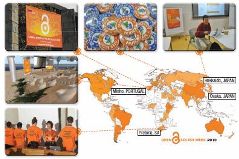The start of an adventure
October saw the fourth global Open Access Week. Heather Joseph and Jennifer McLennan of SPARC report on some of the things going on around the world during the week

‘Open-access publishing… establishes the framework in which a much wider repertoire of adventures can take place… All of these adventures are tremendously exciting because they markedly enrich the experience of being a scientist, of reading the work of others and of exchanging views with others in the scientifi c community.’
These were some of the words with which Nobel Prize-winner Harold Varmus, who is the current director of the US National Cancer Institute, co-founder of the Public Library of Science and long-time open-access (OA) champion, helped to kick start the latest Open Access Week.
This global event, which marked its fourth year in October, provides an opportunity for the academic and research community to learn about the potential benefi ts of OA – free, immediate, online access to the results of scholarly research, and the rights to use and re-use those results as needed. The event aims to provide an outlet for the community to share experiences with colleagues and help inspire wider participation in moving OA towards becoming a new norm in scholarship and research. Participation in OA Week tripled this year, with nearly 1,000 sites in 94 countries getting involved.
OA Week was originally championed by libraries and students, but this year’s focus was on fully engaging the researchers and scientists and demonstrating the impact that OA can have on advancing discovery across disciplines. The growth in participation in Open Access Week mirrors the global nature of the research community, and drives home the global nature of the issue.
A global event
Researchers around the world followed Varmus’ lead during the week. At the European Institute for Marine Studies in Brest, France, representatives from CERN discussed the latest in OA publishing, and Jean-Francois Dechamp of the European Commission highlighted developments in access to European research. In Portugal, vice president of the Santarem Polytechnic Institute in Braga, Pedro Reis, addressed listeners at a presentation in Second Life.
On many sites, the power of individual researchers to maximise the exposure of their works was considered. Mona Nemer, provost of the University of Ottawa in Canada, emphasised actions like depositing in OA repositories, publishing in OA journals, managing copyrights and supporting institutional OA policies as effective ways for individuals to promote OA.
Other events illustrated the power of collective action. Fourteen institutions met the Open Access Week OA Mandate Challenge issued by ePrints (at the University of Southampton). Universitat Oberta de Catalunya, Australian National University, and the University of Nottingham are now among the 243 institutions worldwide that are adopting policies to make OA the default for local research outputs. And in the UK, 10 organisations are collaborating in a call for the higher education and research sector to unite behind OA and drive its implementation. The intent of the new UK Open Access Implementation Working Group is to advance policy and promote understanding of the opportunities that OA offers to the UK as a nation.
Beyond the journal
Another outcome that points to the research community’s growing tendency toward OA is the number of events this year that involved not only discussions of OA to journal articles, but also to data, educational resources, and other materials integral to the conduct of research. OA is just one part of creating a larger ecosystem where openness is the norm, and research can be accelerated.
In the various events around the world that we either attended in person or watched on the web over the course of the week, the word ‘inevitable’ was used more times than we could count. There is defi nitely a sense that the open-access genie is out of the bottle, and ready to roll.
Heather Joseph is executive director and Jennifer McLennan is director of programs & operations at SPARC (the Scholarly Publishing and Academic Resources Coalition)






